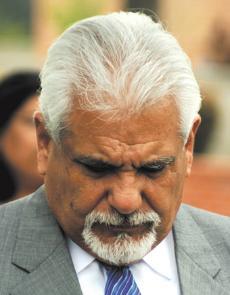By David Morris & Daniel Segraves

Daniel Castro, no longer the college president as of the end of the fall 2007 semester. (Christopher Dietrich)
By David Morris & Daniel Segraves
Over the past two months, RCC has seen the resignation of President Daniel Castro, the hiring and the transition of an acting president for an interim president and progress on the search for a replacement for Chancellor Salvatore Rotella.
The controversy began Dec. 8 when Tish Chavez, Castro’s assistant, sent a mass e-mail to all faculty, staff and administration at RCC.
The e-mail was sent on the behalf of Castro and announced his resignation as president as of Dec. 11.
“I have had the opportunity to work with some of the best administrators, faculty, staff and students,” Castro’s e-mail read. “(I) know that I leave RCC in good hands.”
Technically, Castro would remain president until the end of the year. Chancellor Rotella, however, chose Linda Lacy, then the vice chancellor of Student Services, to serve as acting president in Castro’s absence.
No rationale for the sudden departure was given at the time, nor has one been confirmed as of now, but the lack of evidence did not stop the events to follow.
Accusations from faculty members on all sides of the issue began to surface, all of which remained consistent with the individual views of Castro’s performance as president.
The first of these comments came Dec. 12 when Political Science instructors Dariush Haghighat and Ward Schinke sent their views via e-mail to the RCC administration, attacking Castro’s previous record at other schools and his demeanor as president of RCC.
One of the major points the instructors made was the lack of information that the hiring committee gathered. “One of us served on Castro’s hiring committee and what bothered this member… was the fact that nobody from this college was provided an opportunity to do any field research,” the letter stated.
Another large problem that the e-mail addressed was the changing of class schedules; Haghighat and Schinke declared that the altered schedule could be linked to the drop in enrollment at RCC.
But it was not just the alleged administrative errors that Haghighat and Schinke dealt with, but what they claimed was Castro’s “lack of vision… and his absolute contempt for the principle of shared governance.”
Despite Haghighat’s and Schinke’s belief that their views were held by most faculty members, numerous responders have come forward to speak out about the nature of Castro’s departure. While no definitive answer has been released, what is certain is the dissent against the Haghighat-Schinke letter.
Kathryn Brooks, Academic Senate vice president and associate professor of Life Sciences, as well as Grace Slocum, a Board of Trustees member at the time of Castro’s resignation, strongly opposed the views of Haghighat and Schinke.
In a responding e-mail sent to the entire RCC staff, Brooks not only contradicted the statements of Haghighat and Schinke, but referred to their actions as “questionable” and the letter as “negative and false information.”
Brooks continued by asking for proof of any of the facts that the first e-mail declared, and mentioning that a top California Teachers Association official had received “one or more requests for a ‘No Confidence’ vote,” that Brooks claims would have failed, if it had been considered.
“The issue is one of integrity,” Brooks said. “What evidence do they have to support such an extreme action which apparently contributed to the termination of an individual’s employment… without Board approval?”
In an interview with Viewpoints, Brooks offered evidence to prove Castro had dropped his own proposals at times out of respect for faculty’s opposing views, as well as changing the schedule to benefit students.
“Instead of having classes once or twice a week for hours, President Castro wished to have classes that went four days a week that weren’t nearly as long,” Brooks said. “He also wanted to have remedial classes taught more than one day a week. It was in the interest of the students. Enrollment is down statewide; it’s not an isolated case.”
Slocum’s views paralleled Brooks in the instructor’s view of Rotella as a key player in Castro’s resignation and the chancellor’s “Machiavellian approach to college administration.”
“(Castro) was not happy,” Slocum said. “He was not allowed to do his job. The thing with the kind of change Castro was proposing is that it always makes people angry. Some changes were legally required, so any trouble with accreditation won’t surprise me. It’s all gone down the tubes.”
As the war of words continues and a finite explanation for the mysterious resignation (voluntary or otherwise) of Castro is yet to be discovered, Lacy has her own plans for RCC and offered a timeline for choosing a new, full-time president as well as a new chancellor.
Lacy has given her foremost attention to accreditation, but believes that other top priorities will include “developing an effective and efficient program to provide basic skill instruction so students can quickly get on track for degree obtainment or transfer” and construction of the A.G. Paul Quadrangle, which she believes will require a lot of attention.
“The new president will not be chosen until a new chancellor is in place,” Lacy said.
While a new chancellor could be hired sometime in the next few months, “contractual obligations at a current institution may keep a new chancellor from being instated until as late as June.”
Rotella was contacted for this article but declined to offer any information on the matter.






